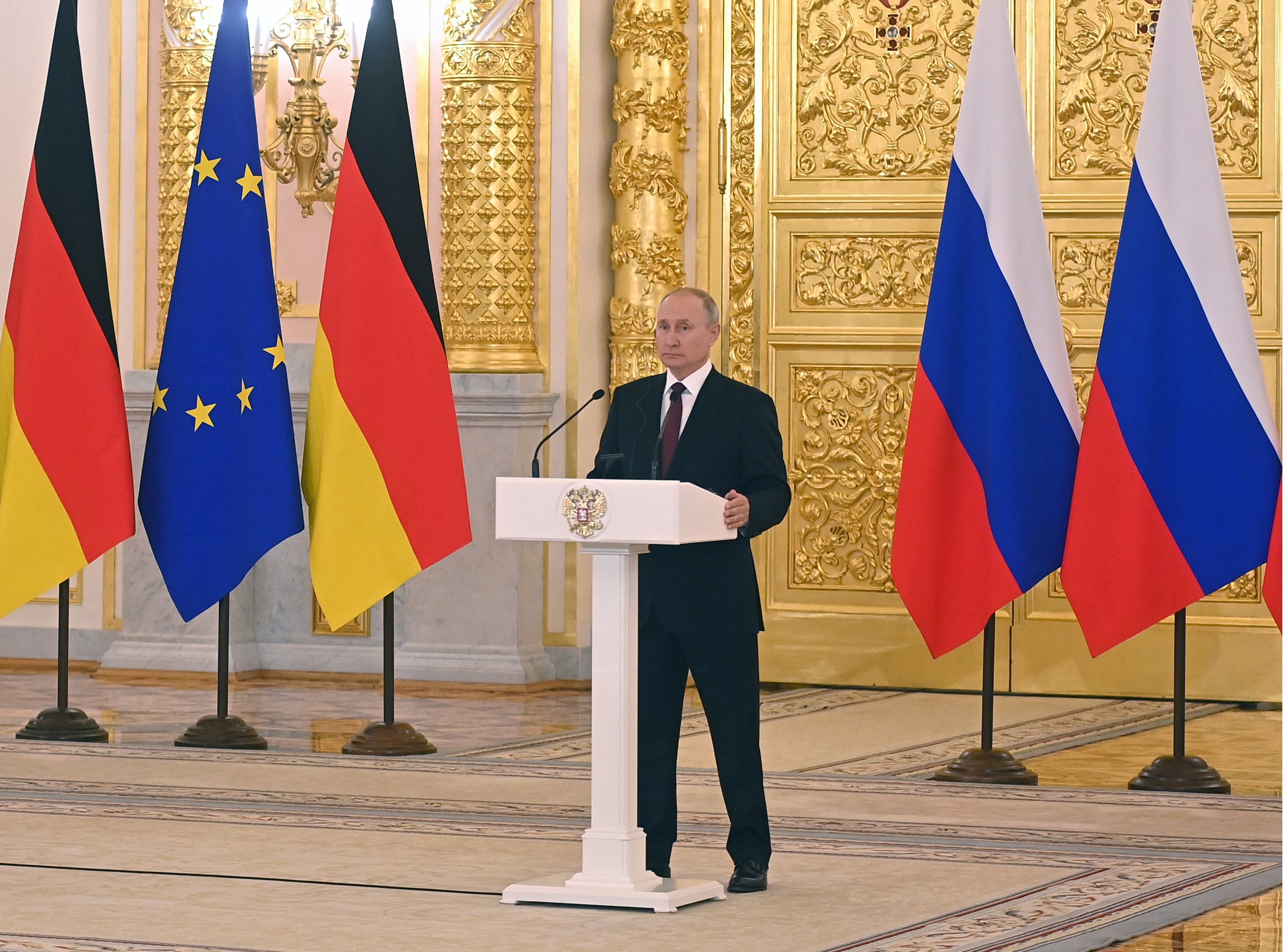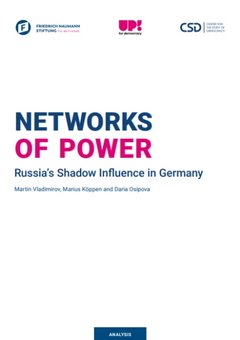Study
Networks of Power: Russia’s Shadow Influence in Germany

Russian President Vladimir Putin.
© picture alliance/dpa/TASS | Yevgeny OdinokovDespite measures to reduce dependence on Russian energy supplies following the Russian full-scale invasion of Ukraine, Germany's economy and political system remain vulnerable to Russian malign influence. Extensive German-Russian networks, which Russia has cultivated and entrenched for decades, continue to play a crucial role in maintaining strong economic ties between Germany and Russia. They have also actively shaped public discourse and Russia's image in Germany. At the heart of the Kremlin's playbook is a model of state capture in which Russia uses its extensive security apparatus and control over Russian companies and oligarchs to leverage long-term dependencies and foster an environment in which strategic energy partnerships constrain Germany's policy options.
Kremlin-sponsored disinformation campaigns have sought to further polarise German society by exploiting grievances over domestic political debates, energy costs and the nation's support for Ukraine. By combining economic interests with social manipulation, aggressive diplomatic and military rhetoric, the Kremlin has cultivated an ecosystem that amplifies its political influence.
A comprehensive analysis of German-Russian networks revealed a deeply interconnected web of actors, ranging from business leaders to cultural organisations. German-Russian platforms like the German-Russian Forum, the New Generation and the Russia Day in Mecklenburg Vorpommern provide high-profile formal spaces on and around which Russian influence could be built to permeate German politics and society. By aligning economic interests with political narratives, these organisations serve as hubs of pro-Russian sentiment and creating channels for Kremlin-backed agendas to reach influential stakeholders.
The case of the Nord Stream II pipeline illustrates the effectiveness of Russian influence operations. Ostensibly a commercial venture, the project was supported by a network of German enablers, including politicians, businesses and NGOs, who worked to circumvent foreign partners and domestic opposition and sanctions. Local networks in the German province of Mecklenburg-Vorpommern played a particularly crucial role, embedding and entrenching Russian interests in regional governance processes and facilitating the pipeline's completion despite mounting geopolitical risks.
Two years after the start of Russia's war on Ukraine, Mecklenburg-Vorpommern remains a target for Russian influence operations, as evidenced by the plans to build a new LNG terminal in the port of Rostock by a German company with ties to Russia's major LNG exporter, Novatek.
The Kremlin’s influence extends far into Germany’s political landscape, particularly through alliances with far-right movements. Russian oligarchs, close to the Kremlin, such as Vladimir Yakunin and Konstantin Malofeev, have cultivated strong relationships with far-right politicians, funding ideological initiatives and amplifying anti-EU and anti-Western sentiments. These political-oligarchic alliances are part of a broader Kremlin strategy to exploit ideological divisions and undermine the EU unity of strategic foreign policy objectives including the support for Ukraine.
The AfD MP Beatrix von Storch (born von Oldenburg) as well as several other members of her aristocratic family are deeply involved in these networks as their activities have opened the doors for Russian influence to spread deep into the fabrics of the German political elite by establishing close ties with German business, political parties, and civil society.
Several major law firms and consultancies have acted as enablers of Russia’s economic influence in Germany, providing legal, strategic and PR support to German and Russian companies involved in the networks. They have structured deals and have facilitated joint ventures that have increased Russia's leverage over Germany's energy sector and have given it access to critical German technology for advancing its LNG industry.
Following Russia’s invasion, many of these enablers shifted the focus of their consulting activities from Russia to Central Asia and Türkiye, following the flow of redirected German exports towards these regions. Given their former close ties with Russian entities and the involvement of its members in the German-Russian networks, there is a risk that these lawyers and consultants could act as intermediaries in a triangle involving German, Russian and Central Asian or Turkish companies, sparking new sanctions evasion strategies to divert German exports of sanctioned goods to Russia.
There is mounting evidence that indirect trade and dual-use goods exports continue to flow, trying to restore business as usual, and undermining the intended impact of the EU sanctions. Overall, the increase in German dual-use exports to Türkiye, the UAE and Central Asia accounts for about 85% of the reduction in average monthly exports to Russia since the beginning of the war. For some specific dual-use items, the increase in average monthly German exports to intermediate countries has more than offset the reduction in exports to Russia. The Russian automotive industry particularly appears to exhibit resilience against sanctions, in part due to re-exports of German automotive parts. Given the significant role of the German industry in supporting Russia's war efforts in Ukraine, it is crucial to uphold stringent export controls on manufactured goods that can be used to aid the production of Russian military equipment. The resilience of these trade networks demonstrates the lack of policy resolve in Berlin and Brussels to respond to the Kremlin’s attack on Ukraine, which has weakened sanctions enforcement, and has helped preserve the Russian influence mechanisms in Germany.
Germany must dismantle entrenched Russian influence networks while building systemic safeguards to prevent their resurgence. Establishing a National Foreign Influence Task Force can enhance oversight across critical sectors such as energy, finance, and media, while stricter sanctions enforcement, investment screening, and public transparency mandates will help disrupt illicit financial flows and covert influence operations. Engaging German business in non-Russian friend-shoring investment opportunities and supply chains will contribute to the geoeconomic de-risking of the country’s export-oriented growth model. At the same time, accelerating the green transition will strengthen Germany’s energy security and economic independence.
Targeted sanctions on key actors and expanded anti-corruption legislation are vital to countering strategic corruption and undermining malign networks in Germany. By coordinating these measures with the U.S. and other EU members, Germany can safeguard its democratic institutions and lead the European efforts in countering the growing authoritarian threat.
The study was first published in the Süddeutsche Zeitung on 11 December 2024.

